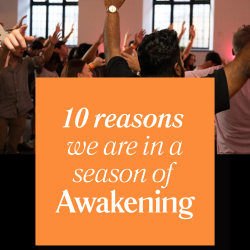
Today's blog is written by Rev. Richard Pennystan, vicar at St Chad's in Romiley.
Very soon, churches with universities nearby will be thinking about how to connect with freshers and in our desire to connect with students, many churches put on a free meal & invite them to it.
That’s all fine, the Holy Spirit might lead us to do just that, Jesus connected with people over food. But my question is how do we avoid the patronising invitation/notice from the front of church; - Next Sunday after church, we’d love to meet you….and there’s free pizza, so that’s worth coming to…. ?
I don’t want to attack anyone personally, I’ve given that notice myself. But even as the words came out of my mouth, something in me screamed ‘this isn’t right’.
Firstly it feel like an anachronistic throw back to the 1970s and the image of student life in ‘Rising Damp’ (if you’re under 40 - look it up on IMDB!) Most students although afraid of debt aren’t so struggling financially that they can’t eat, so the projection onto them of extreme poverty can be a cultural disconnect.
The next layer down of miscommunication is this notice subtly implies, ‘We don’t really think that meeting with Jesus, worshipping him, encountering him and growing in understanding of his word is enough - so pizza will make Jesus more attractive’
But the most concerning aspect is the subtext of the message, which communicates ‘Come to our church and we’ll look after you and feed you, because poor you, we don’t think you can cope at university.’
That will attract some students to your church and you’ll spend 3 years looking after them until they graduate and then find church doesn’t exist just to meet their needs and then many will fall away.
Is that the message you want to give to students - or is there another way?
This is the first point of contact with freshers so the first thing we say to them needs to communicate the answer to their question ‘‘what will happen in my life if I join this church?’
Is our answer we want you to be part of our annual batch of students, to fill our pews and make our church seem young and exciting and prevent you from backsliding in that dangerous nasty world. (& we really need some more helpers in creche)
Or we believe you are young apostles, prophets, evangelists, pastors and teachers full of the Holy Spirit. So can we support you in advancing the kingdom in a fertile but hectic mission field and as you do that, we’ll try and create a culture where you can mature into godly disciples with great roots for the rest of your life.
The greatest hope for our campuses and colleges and halls of residence – is students who are on fire with love for God, solid in their identity and empowered and connected to local churches who can work with them in evangelism and discipleship.
So how about our first message to students being – come and join us & together we’ll partner in seeing God impact your mission field? or ‘we’ve got resources available to feed people - what’s your passion for feeding others? - we can help you.’
You will probably buy them pizza along the way, they’ll appreciate that. When they start seeing their friends saved and God doing amazing things, they’ll probably want to buy you beer to celebrate – let them do it, its all part of discipleship, to empower. Give them the dignity & respect of being generous, not impoverished.
As Paul said to the Colossians; ‘to present everyone mature in Christ’.
The word 'mature' here comes from the root of being full, complete. Students don't become mature or complete or full from free pizza, they grow up as they learn to give & serve & enjoy sacrificial generosity, not continue to live as the needy consumers their culture has targeted them as.






